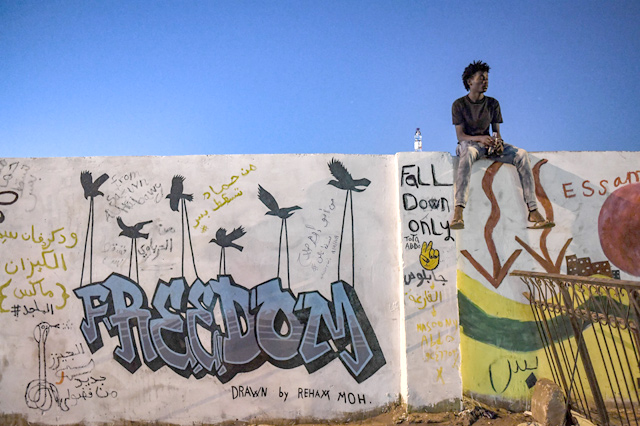KHARTOUM —The graffiti that symbolised Sudan’s uprising are being painted over across the capital Khartoum, protest leaders complained on Wednesday, urging the military authorities to stop their whitewashing.
The Alliance for Freedom and Change that led the months-long protest movement that brought down Omar Al Bashir said the “enemies of the revolution” had been systematically erasing murals.
“We see this as an ugly act and a pathetic attempt to suppress the beauty, the letter and the spirit of the revolution,” it said a statement.
In recent days some of the colourful murals and slogans that appeared on the walls of the capital during the early stages of the protest that ousted Bashir were painted over.
Together with music, these murals had become a symbol of the popular nature of an uprising that was led by young activists rather than engineered by political opposition.
Most of the murals and graffiti could be found on walls outside of the army headquarters in Khartoum, where protesters camped out for weeks on end.
“This is an absurd measure and shows the inability of the enemies of the revolution to recognise its roots and its realisation in people’s hearts,” the statement said.
It called on graffiti artists to “continue painting murals and exercise all their freedom of expression rights”.
‘No real change’
Continued mobilisation and a deadly crackdown on a sit-in on June 3 led to a phase of negotiations that yielded a transition agreement to be officially signed on Saturday.
The deal agreed by Sudan’s generals and protest leaders provides for a power-sharing period of 39 months meant to pave the way for elections and civilian rule.
Some members of the protest camp however were displeased with an agreement they fear could allow those forces accused of brutal repression during the uprising to maintain their grip on power.
One graffiti artist contacted by AFP said that the decision to remove murals from Khartoum’s walls was evidence that the military establishment was reverting to its old ways.
“When I saw this I felt very disappointed because when we did these murals we were expressing the feeling that the times were changing,” Lotfy Abdel Fattah said.
“And now the signals we are getting tell us that there is no real change, no real freedom,” he said.
Speaking to AFP at the height of the protests in April, he had predicted that the murals might not all stay forever but he argued now that they should remain as a testament to a pivotal moment in Sudan’s history.
Some of the murals also honour protesters who were killed by security forces.
“I don’t know exactly who is doing this but it’s definitely someone with an agenda against change, because what we did was a beautiful thing,” Abdel Fattah said.
